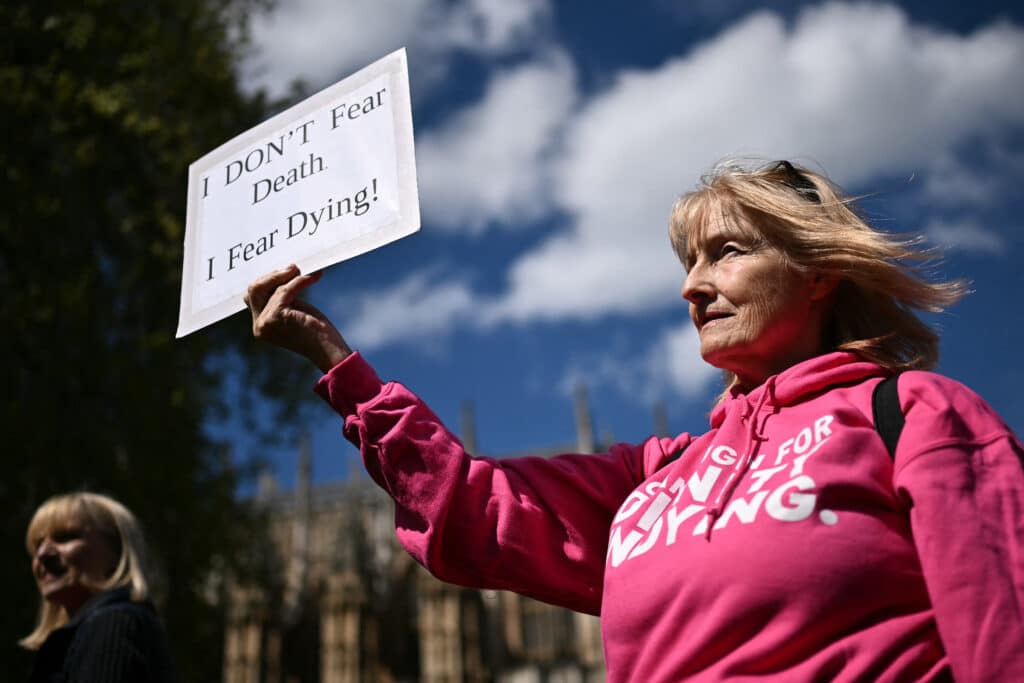

(FILES) A disability campaigner from “Dignity in Dying” holds a placard as she demonstrates outside The Palace of Westminster, home to the Houses of Parliament in central London, on April 29, 2024, during a gathering in favour of the proposals to legalise assisted suicide in the UK.| Photo by Ben Stansall / AFP
LONDON, United Kingdom — A new proposal to legalise assisted dying in England and Wales was introduced in the UK parliament on Wednesday, sparking concern from senior church leaders and opponents about its implications.
Lawmakers in the House of Commons will get a free vote on Labour MP Kim Leadbeater’s Terminally Ill Adults (End of Life) Bill, allowing them to vote with their conscience rather than along party-political lines.
READ MORE:
First suicide pod use ‘soon’ in Switzerland – campaigners
Cebu City Health Dep’t should have program for suicide prevention — dad
Details have not yet been published but an official with knowledge of the matter told AFP the bill in its current form would require a patient’s wish to die to be signed off by a judge and two doctors.
It would also be limited to those with six to 12 months to live.
Supporters and opponents of changing the law made their voices heard outside parliament, where an assisted dying bill was last debated — and defeated — in the Commons in 2015.
Anil Douglas, 39, said an assisted dying law would have provided “safety” and “dignity” to his father, who took his own life.
“It was a very lonely, dangerous, isolated death. He was forced to take very drastic action behind closed doors and couldn’t discuss his decision with any of us that loved him,” he said.
– ‘Not about disabled people’ –
Currently, assisted suicide is banned in England, Wales and Northern Ireland, with a maximum prison sentence of 14 years.
In Scotland, which has a separate legal system and devolved powers to set its own health policy, it is not a specific criminal offence. But it can leave a person open to other charges, including murder.
Leadbeater said her bill reflected a shift in public opinion towards assisted dying, which has been legalised to varying degrees in a number of European countries.
She promised “very robust, very secure safeguards” but said the main thrust of the change was about giving people at the end of their life choice.
“This is not about disabled people. It’s not about old people. It’s about people who are terminally ill and the rights that I believe they should have,” she told AFP.
“At the heart of this is the fact that at the moment, people are taking their lives, losing their lives in really difficult circumstances, and that needs to change.”
– ‘Dangerous’ –
Opponents of the bill include some disability rights groups and the UK’s highest-ranking Roman Catholic cleric, Cardinal Vincent Nichols, who has urged followers to write to MPs to oppose the change.
On Tuesday night, the leader of the world’s Anglican communion, Archbishop of Canterbury Justin Welby, called the proposal a “dangerous… slippery slope” towards it being used by those who are not terminally ill.
Welby will get a vote on the matter as he is one of the 26 “lords spiritual”, senior Church of England clerics who sit in the upper chamber House of Lords.
Alistair Thompson, from anti-euthanasia group Care Not Killing, also said changing the law could see the country follow Belgium and the Netherlands, which have both extended assisted dying to minors.
“We know that introducing an assisted suicidal euthanasia bill would put a lot of people under pressure to end their lives prematurely,” he told AFP.
MPs are expected to debate and vote on the bill on November 29. The outcome is difficult to predict given Leadbeater introduced it as a private member’s bill and not as part of the government’s legislative agenda.
Starmer has voiced support for assisted dying in the past — something that may encourage Labour’s legion of new MPs to back a change.
Lawmakers may also be influenced by polls showing majority support for assisted dying among the public.
A bill to make assisted dying legal in Scotland was introduced in the Scottish Parliament in Edinburgh earlier this year.
The Isle of Man and Jersey — self-governing British Crown Dependencies which are not part of the UK — are also moving towards passing laws to give terminally ill people the right to die.
Belgium, along with the Netherlands, in 2002 became the first EU countries to allow euthanasia.
Spain in 2021 authorised euthanasia and medically assisted suicide for people with a serious and incurable illness, followed by Portugal in 2023.
Read Next
Disclaimer: The comments uploaded on this site do not necessarily represent or reflect the views of management and owner of Cebudailynews. We reserve the right to exclude comments that we deem to be inconsistent with our editorial standards.











